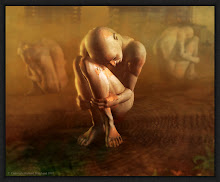The Psychological Theater
It is bewildering and mystifying the way the theater of the mind works. There are few forces as powerful as the mind; the imagination and the strength of emotion working in tandem can be incredible tools for those who know the art of using them. It can be used to create a host of perceived realities and illusions that seem as solid light; playing upon vulnerabilities, prejudices, biases, preferences, and other predispositions. These predispositions create avenues for those who can find them; avenues to create new possibilities, new emotions, and new behaviors that either play upon or against those afore-mentioned elements.
Such is the mechanism behind most forms of art. There is this incredible blending of imagination and emotion that creates this boundless, borderless world where anything is possible, far beyond the limitations of the physical world. A vast field where the mind roams, once the false borders and restrictions that are put in place are broke down. Psychological walls of beliefs and values that are inconsistent, irrational and ultimately unnecessary only hinder the mind from being what it can and should be; a world of its own, a world of elemental forces far greater than any in this ‘real’ world.
Such is the mechanism behind drama plays. The playwright creates the world; the actors become the psychological elements and forces that manipulate the audiences. What is the measure of a successful play? For me, it is the extent of the control that the actors are able to exert upon the minds of the audience. Unlike other forms of art, where the reader or listener or viewer is able to allow the mind to roam free, theater plays are all about manipulation and influence and control; the audience is never allowed to go further than what the actors would want them to. An interesting reversal of the entire concept of art; but then again, theater is not really art, is it? It becomes more an exercise of control and power. The script itself is a medium, a door that opens up possibilities; therefore it retains its artistic purity. However, when there are actors interpreting characters, and making decisions on what they want to portray, it becomes consolidated; it becomes established; it becomes structured. Power is established and control is exhibited.
Such control becomes integral for the play. Psychologically demanding plays such as mystery thrillers require a huge amount of control and depth of the part of the actors, who have to make sure that the audience only thinks in a pattern that they have already set, and not beyond. Every single realization, assumption and deceptions must be something the actors expect and set out, for only then can they establish the climax that they seek. Characters represent mediums for this form of control to be exerted. The audience will expect it; it is only when they are able to make judgments and think beyond the expectations of the actors that the play fails as they will automatically be disappointed. They want to be taken for a ride; they want the unpredictability that will give them a rush of emotions and feeling. That is what the actors should aim for.


No comments:
Post a Comment